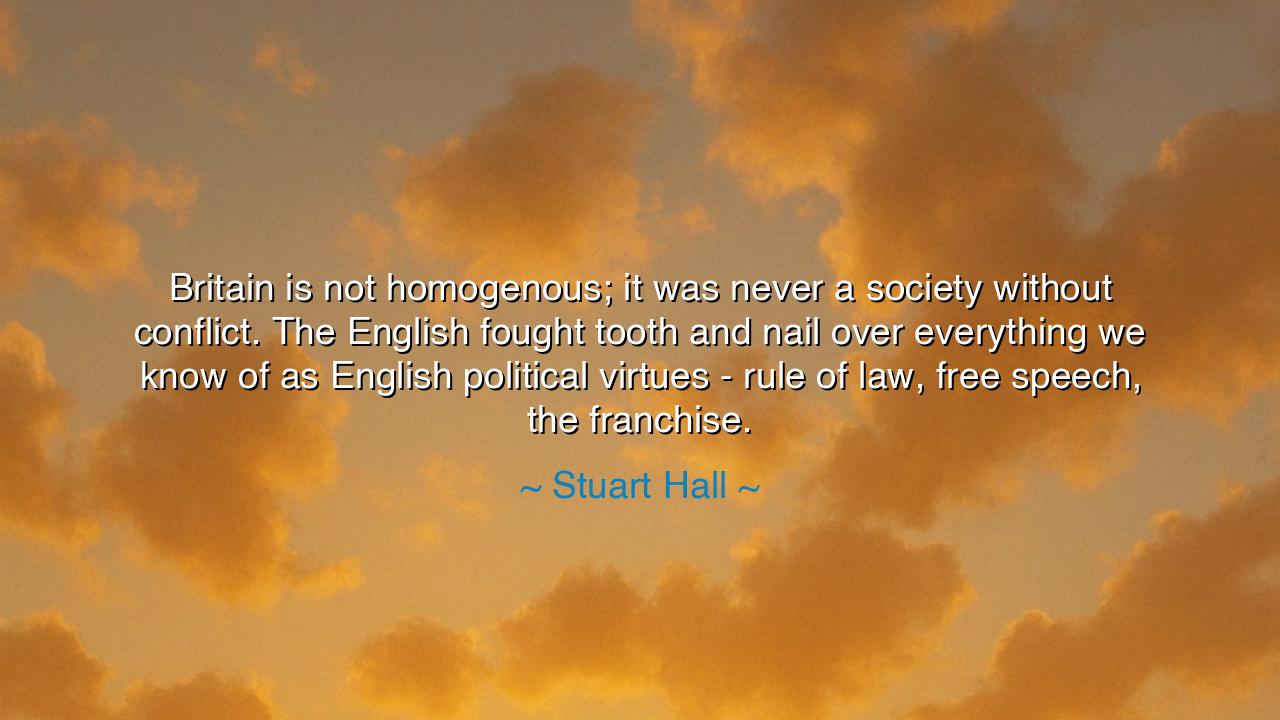
Britain is not homogenous; it was never a society without
Britain is not homogenous; it was never a society without conflict. The English fought tooth and nail over everything we know of as English political virtues - rule of law, free speech, the franchise.






The words of Stuart Hall, “Britain is not homogenous; it was never a society without conflict. The English fought tooth and nail over everything we know of as English political virtues – rule of law, free speech, the franchise,” ring like the toll of a great bell across the centuries. Here he reminds us that what is often presented as calm tradition and inherited virtue was, in truth, carved from strife. The rule of law, the right to free speech, the power of the franchise—these were not gifts handed down by kings in generosity, but victories wrestled from their grasp by a people who refused to bow forever. Hall unmasks the myth of a quiet, uniform England and reveals instead a living battlefield of ideas, of passions, and of blood.
The origin of this truth is written in the annals of British history. The Magna Carta of 1215 did not emerge from peace but from rebellion, when barons stood against King John to demand that even monarchs be bound by law. The struggle for rule of law was not harmonious; it was storm and steel, a declaration that liberty must be fought for, not awaited. And so the seed was planted, though centuries of conflict would water it with strife until it grew into the principle that law stands above power.
Consider also the long, painful fight for free speech. In times past, the words of dissenters were silenced by prison walls or the gallows. The poet John Milton, in his “Areopagitica,” pleaded against censorship, insisting that truth could not flourish if strangled at its birth. Yet his cry did not end suppression; it merely lit a torch for others to carry. The newspapers that emerged in later centuries were born amid constant battle with authority, and every right we now claim to speak and publish freely was once a crime punished harshly. What Hall reminds us is this: free speech was not born of politeness, but of resistance.
The franchise, the right to vote, offers perhaps the clearest example of conflict shaping virtue. For centuries, only the wealthy landowners held the power of voice in government, while workers, women, and the poor were excluded. The great Reform Acts of the 19th century came not from generosity but from pressure, petitions, marches, and riots. The suffragettes, led by women like Emmeline Pankhurst, endured imprisonment, hunger strikes, and violence so that half the nation might gain the right to vote. The franchise was won not by patience alone, but by tooth and nail, as Hall so vividly puts it.
The deeper meaning of Hall’s words is thus revealed: there has never been a homogenous Britain, a single, undivided people walking in quiet agreement. Instead, there has been a Britain forged in argument, sharpened in struggle, enriched by the voices of many. To imagine otherwise is to dishonor the countless unnamed men and women who fought, not with armies alone, but with courage, wit, persistence, and sacrifice. Conflict is not the enemy of progress; it is the crucible that burns away injustice and leaves behind enduring principles.
What lesson, then, should we carry? That we must not mistake comfort for freedom, nor assume that what was gained will never be lost. Every right, every liberty, every protection was hard-won, and may again be threatened if we grow complacent. Conflict, when waged for justice, is not a sign of weakness but of vitality. A society without conflict is a society without growth, for it means the powerful go unchallenged and the voiceless remain unheard.
Practical actions follow from this wisdom. Engage in the struggles of your own age—whether they concern equality, justice, climate, or the defense of liberty. Do not fear disagreement; embrace it as the lifeblood of democracy. Speak boldly when freedoms are endangered, and honor the memory of those who fought before by refusing to surrender the gains they secured. Above all, remember that society is never finished, never perfected; it is always in the making, always requiring courage.
Thus let Stuart Hall’s words endure as a testament: Britain is not homogenous, nor without conflict. Its virtues—law, speech, vote—were won through struggle, and so must be preserved through vigilance. The story of liberty is never written in peace alone, but in the fierce and unyielding will of a people determined to be free. Let this be the teaching for every generation: fight not for comfort, but for truth, and you will meet, in the end, the bedrock of human dignity.






AAdministratorAdministrator
Welcome, honored guests. Please leave a comment, we will respond soon